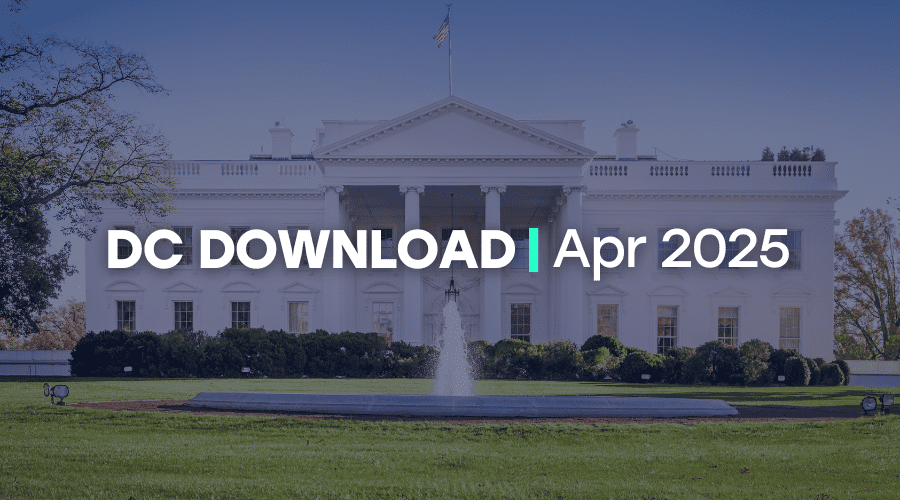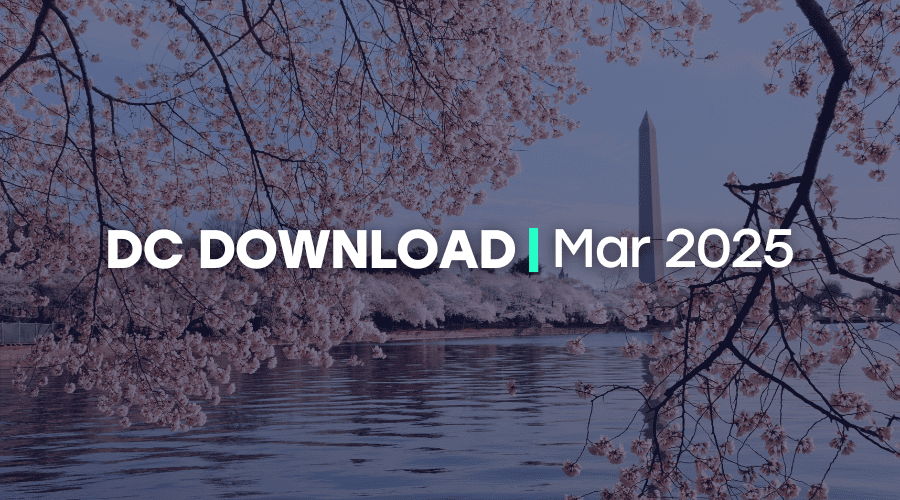As nations across Europe debated and voted on who should be crowned the winner of the annual Eurovision song contest, on this side of the pond Congress spent the month debating and voting on legislation, some of which would directly impact the charitable sector. Much like a song contest, Senators and Representatives were trying to hit the high notes to score points with the judges back in their home states and districts. In case you were preoccupied debating which Eurovision performance deserved the win, here is a rundown of all the latest federal policy happenings impacting the sector.
House Ways and Means Committee Advances Five Bills Impacting Nonprofits
On May 15, 2024, the House Ways and Means Committee advanced five bills which, if enacted, would impact nonprofit contributions and the information nonprofits would be required to collect when receiving contributions. The Taxpayer Data Protection Act (H.R. 8292), No Foreign Election Interference Act (H.R. 8314), and Foreign Grant Reporting Act (H.R. 8290) all advanced with broad bipartisan support, while the American Donor Privacy and Foreign Funding Transparency Act (H.R. 8293) and End Zuckerbucks Act (H.R. 8291) advanced on partisan lines. Speaking to the intent of these bills Chairman Jason Smith (R-MO) said, “This committee has been concerned with the proliferation of tax-exempt organizations that receive generous benefits under section 501 of the U.S. tax code engaging in activities that may not be in line with the spirit or the letter of the law.”
Committee Democrats expressed concern about H.R. 8293, stating that it doesn’t get to the root of the issue. “It’s true that powerful donors use tax exempt organizations to influence our political system. And this is not primarily an issue of foreign donors,” said Rep. Judy Chu (D-CA). “There are plenty of extremely wealthy Americans who make enormous dark money donations to tax exempt organizations specifically for political purposes, all while evading the accountability and transparency requirements that would apply to donations made to traditional 527 political organizations.” If enacted, there is concern in the nonprofit sector that H.R. 8293 would cause an undue administrative burden on nonprofits to collect the national origin of donors. This markup followed a December 2023 hearing, which followed a Request for Information to which Independent Sector responded on September 1, 2023.
Overtime Rule Finalized
On April 23, 2024, the Biden-Harris Administration published the final rule raising the salary threshold that must be met for employees to be classified as exempt from overtime requirements from $35,568 to $43,888 on July 1, 2024, and to $58,656 on January 1, 2025. This two-pronged rule also bumps the threshold up on July 1, 2027, and every three years thereafter using a formula based on the data available at the time of the update.
On May 22, 2024, more than a dozen businesses and industry lobbying groups filed a legal challenge to this rule in the Eastern District of Texas, stating that the rule goes beyond the authority of the agency. This lawsuit was widely expected as business groups also sued to stop similar attempts to update overtime requirements made by the Obama-Biden Administration; additionally, a lawsuit was filed in 2022 against a Trump-Pence Administration rule challenging the idea that any threshold should exist. The Department of Labor’s (DOL) Wage and Hour Division will offer two online seminars on Thursday, May 30 from 2:00 to 3:00 pm ET (English) and Monday, June 3 from 2:00 to 3:00 pm ET (English and Spanish) to discuss the final rule. While the new rule will apply in all jurisdictions subject to the federal minimum wage, it should be noted that some state laws — in California, New York, and Washington — already impose minimum salary thresholds for exemptions higher than the levels outlined in the new rule and thus won’t be impacted by this change. For more details on this issue, read our blog “What does the new DOL overtime eligibility rule mean for nonprofits?”
Bipartisan Tax Deal Still Searching for Momentum
Despite strong House passage in a vote of 357-70 in January 2024, pessimism continues to grow for the prospects of the Smith-Wyden tax deal, which pairs a child tax credit expansion with key business tax incentives. This legislation, led by Sen. Ron Wyden (D-OR) in the Senate and Rep. Jason Smith (R-MO) in the House, includes provisions temporarily reversing business tax increases included in the 2017 Tax Cuts and Jobs Act, an expansion of the refundability of the Child Tax Credit (CTC), the United States-Taiwan Expedited Double-Tax Relief Act, disaster relief, and low-income housing provisions. On May 21, 2024, the House passed the Federal Disaster Tax Relief Act (H.R. 5863), which was part of the Smith-Wyden tax deal, by a vote of 382-7. The passage of H.R. 5863 is one more indication that legislators are not expecting movement on the broader Smith-Wyden bill anytime soon.
Senators and Representatives Raise Support for Nonprofit Workforce Data
Earlier this month, 18 Senators and 15 Representatives lent their public support for providing basic nonprofit workforce data by signing a letter to their colleagues who lead the Appropriations Subcommittee on Labor, Health, and Human Services, Education (LHHS). These letters request funding for the U.S. Bureau of Labor Statistics (BLS) to incorporate nonprofit workforce data into the Quarterly Census of Employment and Wages (QCEW) program in the Fiscal Year (FY) 2025 LHHS appropriations bill. The BLS serves as an invaluable resource to the general public and government agencies at all levels of government by providing gold-standard statistics and analyses that are accurate, objective, relevant, timely, and accessible. However, the BLS currently only releases nonprofit wage and employment data every five years, with the latest data released in 2017. This means public officials and nonprofit employers are forced to make decisions about organizational strategy and workforce projections, without timely or accurate data. The requested funding increase would enable the BLS to add sector specific nonprofit data in future QCEW reports.
Last year, 24 national organizations, including Independent Sector, sent a letter to President Biden requesting that BLS incorporate nonprofit organizations into the QCEW. Incorporating the necessary funding into the FY25 L–HHS appropriations bill is the next step to turning this request into a reality. Visit our website for a list of signatories on the appropriations letters.
OMB Uniform Guidance Updates Issued
Last month, the Office of Management and Budget (OMB) issued the most substantial revision to OMB Uniform Guidance in a decade. These changes include many positive developments for the sector including:
- Raising the guaranteed de minimus rate for indirect costs from 10% to 15%
- Revising Notices of Funding Opportunity to make them more easily readable by potential applicants
- Increasing the single audit threshold from $750,000 to $1,000,000
- Increasing the equipment purchased using Federal funds threshold from $5,000 to $10,000
- Increasing the exclusion of subaward costs from $25,000 to $50,000 for modified total direct cost
OMB has directed all federal agencies to implement the new revisions no later than October 1, 2024. Interested in learning more about the OMB Uniform Guidance? The networks of the National Council of Nonprofits are hosting a free webinar, OMB Uniform Guidance: What the Updates Mean for Nonprofits, on Thursday, May 30 at 3:30 PM – 4:30 PM ET to make sure charitable nonprofits know about the significant improvements to the Uniform Guidance, and what the changes mean for their missions.
Additional Public Service Loan Forgiveness Announced
On May 22, 2024, the Biden-Harris Administration announced an additional $7.7 billion of student debt forgiveness, of which the vast majority, $5.2 billion, are going to nearly 67,000 people under the Public Service Loan Forgiveness (PSLF) program. PSLF was initially established in 2007 and allows people in certain career fields, including employees of 501(c)(3) nonprofits, to have their student debt forgiven after 10 years of loan repayments. Since its inception, PSLF has been an important recruitment tool for the sector when it comes to attracting new employees and keeping them in the sector as it is a huge benefit all 501(c)(3) employers can offer to employees at no cost to them.
Travis Swanson is the Government Relations Manager at Independent Sector



